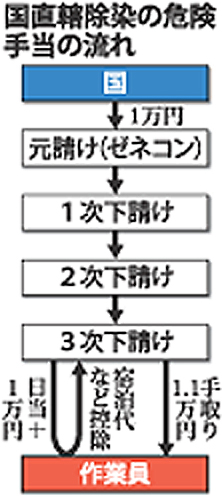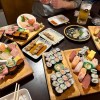A dinner of boiled vegetables and 3.3 square meters of floor space for sleeping, those are the harsh conditions awaiting laborers who undertake government-mandated decontamination work necessitated by the nuclear accident at Tokyo Electric’s Daiichi Nuclear Power Plant in Fukushima Prefecture. In some cases workers are basically laboring for free when taxpayer-funded danger pay is excluded from their pay packets.
General contractors at the top of the pay pyramid and farthest from the dangers of the worksite reap the greatest benefits. They are the ones who directly contract with the government to take on the decontamination work. Once contracted, these firms subcontract work out to other companies, who in turn do the same. Onsite workers are employed by companies that are three or four steps removed from the source of funds. After each firm has taken its cut, not much money is left for paying workers. In the chart below, the national government, which is the source of the funds, is highlighted in blue. It is followed by the general contractor, and then three subcontractors. Highlighted in orange at the bottom of the food chain are the workers taking all the health risks associated with the cleanup.
“I wasn’t treated like a human being,” said a 59-year-old man from Aomori Prefecture who engaged in decontamination work in Tamura City for about two months from September of last year. He and three other workers were made to sleep in a tiny 13-square meter bungalow. He was also shocked when served his first dinner. “The only side dishes to go along with a bowl of rice were boiled eggplant, bean sprouts and bell peppers.” When he and other workers complained to the company, they were given “a couple of slices of packaged ham.”
His work consisted of cutting grass on steep slopes within 20 kilometers of the accident site. Of course there were no shops or restaurants operating nearby. For lunch, the company provided them with simple balls of rice. When questioned, the lady who made the meals said she was instructed by the company to use only 100 yen’s worth of ingredients (about US$1) for breakfast and 200 yen’s worth for dinner per serving.
“It was physically-demanding work, yet they treated us terribly,” the man said angrily.
In February, a 54-year-old worker collapsed and died of a heart attack while laboring in Kawauchi Village, Fukushima.
An acquaintance who introduced the man to the job told him, “You’ll be paid 11,000 yen (US$112) a day to cut roadside weeds. Accommodation and two meals a day are included.” Though that is the actual amount he received, workers are supposed to receive an additional 10,000 yen-a-day in danger pay for cleanup work contracted by the national government. If the amount of that danger pay is subtracted from the wage, it means the company itself was only paying the worker 1,000 yen (about US$10) a day. That works out to be less than one-fifth the prefecture’s minimum wage of 5,500 yen.
After he had been working for a month, the company asked the man to sign a “contract” in which the daily wage section had been left blank. He said he had seen a coworker’s contract which listed the gross wage to be paid as 15,700 yen and a deduction of 4,700 yen for food and lodging, resulting in net pay of 11,000 yen. When the subcontractor was contacted, it replied, “We added the extra government-mandated 10,000 yen danger benefit to the gross pay, however, since there is no agreement regarding deductions, we subtracted food and lodging expenses.”
The system is set up in such a way that multiple subcontractors are involved. A person from one subcontractor attested, “By the time funds reach us the amount needed to pay the danger benefit is no longer there.” The contractor said he had passed on the whole job to a company run by an acquaintance. He lamented, “If something is not shaved off the wages paid to the workers no profit can be made. In the end, only the general contractor is making a buck.”
Source: Otaku.com


 U.S. military personnel launch US$5 billion lawsuit against Tokyo Electrical Power Company
U.S. military personnel launch US$5 billion lawsuit against Tokyo Electrical Power Company Government worker leaves water running for a month, forced to pay half the 6,000,000-yen bill
Government worker leaves water running for a month, forced to pay half the 6,000,000-yen bill Train driver sues Japan Rail…over 56 yen for a one-minute delay
Train driver sues Japan Rail…over 56 yen for a one-minute delay Disappearing anime studio resurfaces, still owes 8 million yen to unpaid workers
Disappearing anime studio resurfaces, still owes 8 million yen to unpaid workers Common ramen ingredient found highly effective at clearing up radioactive contamination
Common ramen ingredient found highly effective at clearing up radioactive contamination How to order snacks on a Shinkansen bullet train in Japan
How to order snacks on a Shinkansen bullet train in Japan Burger King Japan suddenly adds Dr. Pepper and Dr. Pepper floats to its menu nationwide
Burger King Japan suddenly adds Dr. Pepper and Dr. Pepper floats to its menu nationwide New Nintendo Lego kit is a beautiful piece of moving pixel art of Mario and Yoshi【Photos】
New Nintendo Lego kit is a beautiful piece of moving pixel art of Mario and Yoshi【Photos】 Hello, cosmetics! Clinique teams up with Hello Kitty this summer for first-time collaboration
Hello, cosmetics! Clinique teams up with Hello Kitty this summer for first-time collaboration Demon Slayer: Kimetsu no Yaiba gets new roller coaster attractions and food at Universal Studios Japan
Demon Slayer: Kimetsu no Yaiba gets new roller coaster attractions and food at Universal Studios Japan 11 different ways to say “father” in Japanese
11 different ways to say “father” in Japanese Kyoto tea merchant’s matcha parfait ice cream bars: The desserts we’ve been waiting 187 years for
Kyoto tea merchant’s matcha parfait ice cream bars: The desserts we’ve been waiting 187 years for East meets West in the Pacific-centered version of the world map
East meets West in the Pacific-centered version of the world map What do you eat when you catch a cold? We asked 11 of our Japanese reporters
What do you eat when you catch a cold? We asked 11 of our Japanese reporters Shinjuku izakaya’s all-you-can-eat-and-drink plan is one of Tokyo’s best secret cheap eats
Shinjuku izakaya’s all-you-can-eat-and-drink plan is one of Tokyo’s best secret cheap eats Nintendo history you can feel – Super NES, N64, and GameCube controllers become capsule toys
Nintendo history you can feel – Super NES, N64, and GameCube controllers become capsule toys “The most Delicious Cup Noodle in history” – Japan’s French Cup Noodle wins our heart【Taste test】
“The most Delicious Cup Noodle in history” – Japan’s French Cup Noodle wins our heart【Taste test】 Starbucks releases a cute Frappuccino and Unicorn Cake…but not in Japan
Starbucks releases a cute Frappuccino and Unicorn Cake…but not in Japan Kyoto Tower mascot termination reveals dark side behind cute Japanese characters
Kyoto Tower mascot termination reveals dark side behind cute Japanese characters McDonald’s Japan’s Soft Twist Tower: A phantom ice cream only sold at select branches
McDonald’s Japan’s Soft Twist Tower: A phantom ice cream only sold at select branches Yabai Ramen: What makes this Japanese ramen so dangerous?
Yabai Ramen: What makes this Japanese ramen so dangerous? Finally! Nintendo Japan expands Switch 8-bit controller sales to everybody, Online member or not
Finally! Nintendo Japan expands Switch 8-bit controller sales to everybody, Online member or not Japanese government wants to build luxury resorts in all national parks for foreign tourists
Japanese government wants to build luxury resorts in all national parks for foreign tourists To combat declining birth rate, Japan to begin offering “Breeding Visas” to foreigners
To combat declining birth rate, Japan to begin offering “Breeding Visas” to foreigners 10 things you should buy at 7-Eleven in Japan
10 things you should buy at 7-Eleven in Japan Studio Ghibli releases anime heroine cosplay dresses that are super comfy to wear
Studio Ghibli releases anime heroine cosplay dresses that are super comfy to wear Woman charged for driving suitcase without a license in Osaka
Woman charged for driving suitcase without a license in Osaka Studio Ghibli unveils My Neighbour Totoro miniature house model
Studio Ghibli unveils My Neighbour Totoro miniature house model Kyoto experiencing problems with foreign tourists not paying for bus fares, but not on purpose
Kyoto experiencing problems with foreign tourists not paying for bus fares, but not on purpose Fighting mild hunger with a Japanese soda that turns into jelly in the stomach【Taste test】
Fighting mild hunger with a Japanese soda that turns into jelly in the stomach【Taste test】 Studio Ghibli’s Howl’s Moving Castle tapestry unveiled in Japan for first time
Studio Ghibli’s Howl’s Moving Castle tapestry unveiled in Japan for first time McDonald’s new Happy Meals offer up cute and practical Sanrio lifestyle goods
McDonald’s new Happy Meals offer up cute and practical Sanrio lifestyle goods Sales of Japan’s most convenient train ticket/shopping payment cards suspended indefinitely
Sales of Japan’s most convenient train ticket/shopping payment cards suspended indefinitely Sold-out Studio Ghibli desktop humidifiers are back so Totoro can help you through the dry season
Sold-out Studio Ghibli desktop humidifiers are back so Totoro can help you through the dry season Japanese government to make first change to romanization spelling rules since the 1950s
Japanese government to make first change to romanization spelling rules since the 1950s Foreigner’s request for help in Tokyo makes us sad for the state of society
Foreigner’s request for help in Tokyo makes us sad for the state of society Ghibli founders Toshio Suzuki and Hayao Miyazaki contribute to Japanese whisky Totoro label design
Ghibli founders Toshio Suzuki and Hayao Miyazaki contribute to Japanese whisky Totoro label design Doraemon found buried at sea as scene from 1993 anime becomes real life【Photos】
Doraemon found buried at sea as scene from 1993 anime becomes real life【Photos】 Tokyo’s most famous Starbucks is closed
Tokyo’s most famous Starbucks is closed Princesses, fruits, and blacksmiths: Study reveals the 30 most unusual family names in Japan
Princesses, fruits, and blacksmiths: Study reveals the 30 most unusual family names in Japan Universal Studios Japan looks to expand, diversify its workforce with new employee incentives
Universal Studios Japan looks to expand, diversify its workforce with new employee incentives Member of yakuza arrested for having honest job, dishonest application
Member of yakuza arrested for having honest job, dishonest application First worker to die from Fukushima radiation exposure officially recognized by Japan’s government
First worker to die from Fukushima radiation exposure officially recognized by Japan’s government Japan now has over 40,000 foreign convenience store clerks as it continues to internationalize
Japan now has over 40,000 foreign convenience store clerks as it continues to internationalize Japanese netizens praise Starbucks’ move to promote 800 temp workers
Japanese netizens praise Starbucks’ move to promote 800 temp workers Man in Tokyo tries to pay for sex with toy check
Man in Tokyo tries to pay for sex with toy check Survey by Japanese ministry reveals high rates of “maternity harassment” in workplace
Survey by Japanese ministry reveals high rates of “maternity harassment” in workplace Ex-plant worker jailed for 42 months for tainting frozen food
Ex-plant worker jailed for 42 months for tainting frozen food It’s all about the money: The best (and worst) paid student jobs in Japan
It’s all about the money: The best (and worst) paid student jobs in Japan Spanish Prime Minister’s “Japanese-style strike” remark shows a warped view of working in Japan
Spanish Prime Minister’s “Japanese-style strike” remark shows a warped view of working in Japan Meet the the 90-year-old Japanese woman who is McDonald’s Japan’s oldest female employee
Meet the the 90-year-old Japanese woman who is McDonald’s Japan’s oldest female employee Study reveals staff shortage in Japanese firms, suggests a need to accept low-skilled foreigners
Study reveals staff shortage in Japanese firms, suggests a need to accept low-skilled foreigners NHK loses court case to Tokyo woman who can’t watch it because her TV has a blocker installed
NHK loses court case to Tokyo woman who can’t watch it because her TV has a blocker installed Japan’s “workstyle reforms” are actually making managers’ jobs a lot harder【Survey】
Japan’s “workstyle reforms” are actually making managers’ jobs a lot harder【Survey】 Study suggests Japanese workers are deeply distrustful of their employers
Study suggests Japanese workers are deeply distrustful of their employers Japan’s public broadcaster wins landmark court case and 12 bucks
Japan’s public broadcaster wins landmark court case and 12 bucks Government survey finds teleworking at least once per week raises Japanese worker happiness level
Government survey finds teleworking at least once per week raises Japanese worker happiness level
Leave a Reply